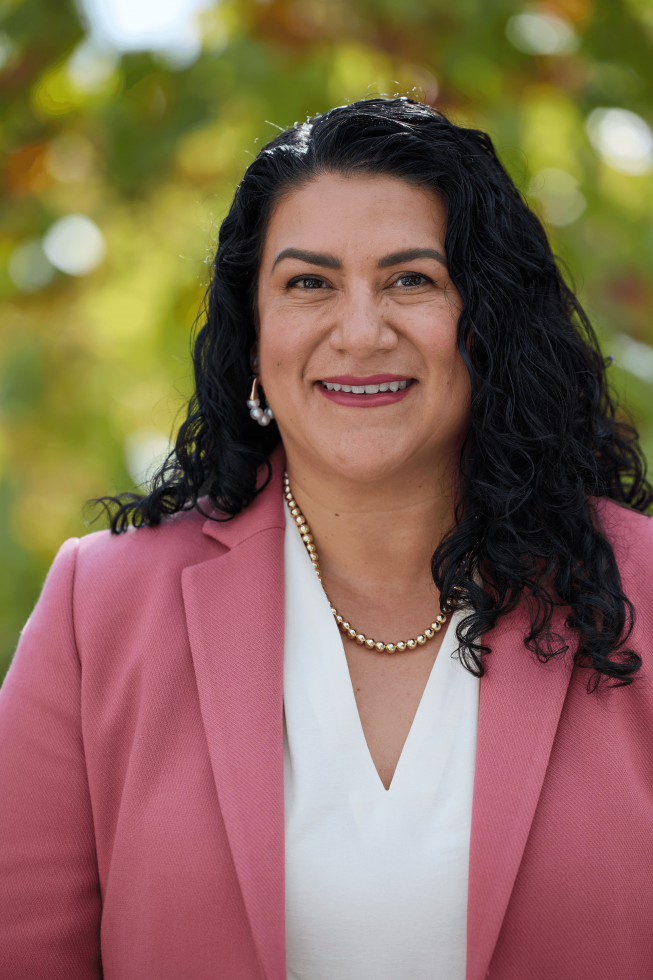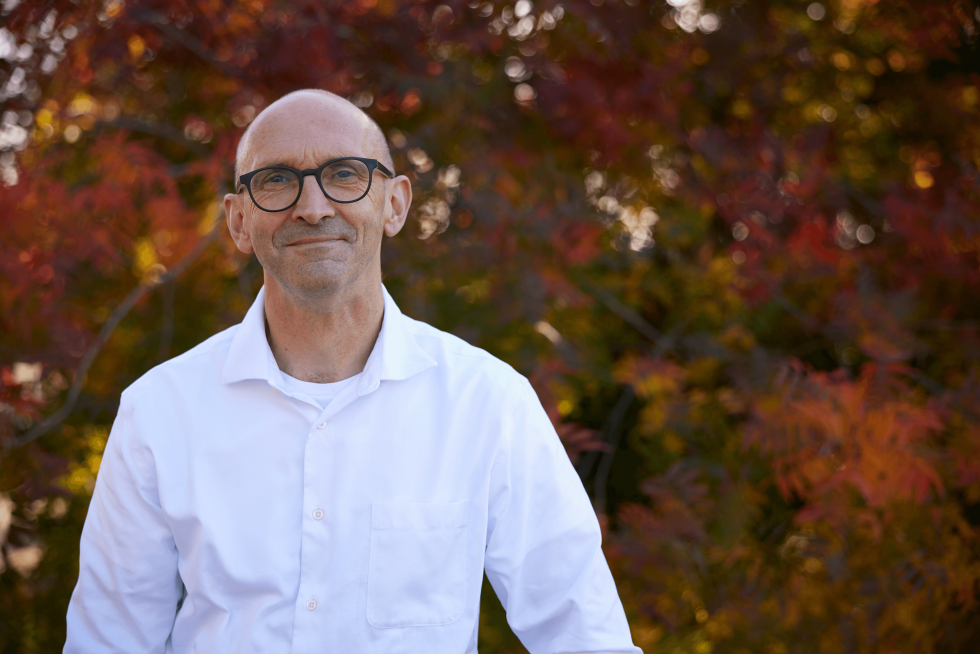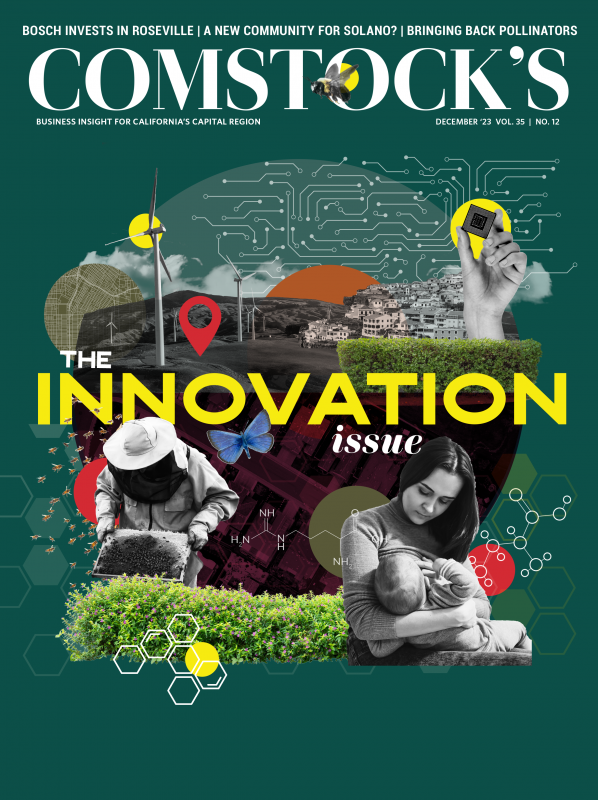Operating under a succession of different owners for nearly four decades, TSI Semiconductors in Roseville was floundering. The 10,000-square-foot fabrication plant on Foothills Boulevard was one of the last remaining microchip plants in the state, supplying custom chips for the automotive, aerospace, health care, defense and other industries.
A myriad of challenges over the years hampered the triumphs. The chip manufacturer was also particularly hard hit when the economy shifted and manufacturing moved overseas, enticed by cheap labor and favorable tax rates. In 2018, the company slashed half its workforce following the loss of its largest client. Since then, it has been looking for a way back. Enter Bosch, the world’s largest auto-parts supplier and a well-respected engineering company.
In August 2023, Bosch acquired TSI with the intention of producing silicon carbide chips, a major element in the production of electric vehicles. Bosch is betting that the global demand for silicon carbide chips will continue to grow and intends to invest $1.5 billion in the new fabrication. The semiconductor deal is the largest in California in three decades and has the potential to put the Capital Region on the map for similar types of ventures.
“It’s one thing to get 250 people that produce semiconductors, but if you can get people with a rich experience and long tenure with the company like we have here, that’s a great asset. It’s not just people, it’s not just about head count; it’s really a pool of talent that we are tapping into.”Thorsten Scheer, regional vice president for Bosch’s North American Automotive Electronics division and the new plant manager of the Roseville site
“We have been working with TSI for years, trying to sell them, keep them alive, get them to expand,” explains Barry Broome, president and CEO of the Greater Sacramento Economic Council, a nonprofit that works to attract, retain and build companies in the Capital Region. GSEC was also encouraging TSI to apply for funding through the CHIPS and Science Act, a federal initiative that aims to revitalize domestic manufacturing and accelerate innovative industries. A GSEC contingent was in Washington, D.C., working on the CHIPS legislation when rumblings of a Bosch deal first surfaced.
“People accidentally leak news,” laughs Broome, who was also working with the organization’s consulting networks to gather more information. In January 2023, TSI reached out to GSEC to confirm they were talking to Bosch about an acquisition. “Once we were brought into the conversation, a lot of the details started to make sense,” he says.
The City of Roseville was also invited to the table and put together an incentive package that would help entice the manufacturer. “We own and operate our utilities and have the advantage of not only offering very affordable utilities as a municipal provider, but also reliable utilities, which we know is very important to the operations of the site,” says Melissa Anguiano, economic development director for the city. Roseville owns and operates its own electric, water, sewer and storm drain utilities.
During its due diligence, Bosch was considering multiple cities and a few southern states, including Texas. The Roseville site made the short list for several reasons. Two of the biggest attractions: the existing fabrication infrastructure — with room to grow — and a highly skilled and knowledgeable workforce. Federal, state and local funding opportunities, along with a pipeline of higher education talent through a robust college network, were added incentives; the delivery of consistent, affordable power through Roseville Electric was the linchpin. To get the deal done, several “people and entities had to perform,” according to Broome. Since the deal closed, Bosch has been working on an aggressive timeline to produce its first silicon carbide chips by 2026 and be fully operational by 2032.
Melissa Anguiano, economic development director for Roseville,
said the city helped lure Bosch with an incentive package that
included affordable and reliable utilities. Roseville owns and
operates its own utilities. (Photos by Fred Greaves)

Thorsten Scheer, regional vice president for Bosch’s North American Automotive Electronics division and the new plant manager of the Roseville site, made the move from Germany to Roseville in October 2023 to take the helm. The German engineering company is looking at the Roseville plant as just one piece in a much larger global picture, citing the silicon carbide market as fast-growing with a lot of upsides. Scheer says the silicon carbide chip is one element of the electrification automation market, and Bosch is looking to play a major role.
“The silicon carbide business offers incredible, attractive opportunities for great improvements in the efficiency of electric cars,” Scheer says, rattling off a list of benefits that include more efficient charging, greater run length and smaller battery size. With California’s zero-emission mandate for all new cars starting in 2035, the timing is ideal.
Bosch has semiconductor plants in the German towns of Dresden and Reutlingen; this is the first time the company has expanded its chip production into the U.S. Acquiring the existing manufacturing plant — complete with clean room and millions of dollars in sophisticated equipment — improves the company’s time to market.
“We still have to refurbish the facility, which will cost a significant amount, but it’s quicker than basically starting from scratch with a piece of land,” says Scheer. Bosch’s $1.5 billion investment in the plant will depend largely on the financing it can put together. The company has been approved for a $25 million California Competes Tax Credit and is applying for funding through the CHIPS and Science Act.
Scheer speaks animatedly about the new Roseville venture, particularly the existing workforce. “It’s one thing to get 250 people that produce semiconductors, but if you can get people with a rich experience and long tenure with the company like we have here, that’s a great asset. It’s not just people, it’s not just about head count; it’s really a pool of talent that we are tapping into.”
Some of the current employees have been with the company since it was founded by Japan-based NEC Electronics in 1984. NEC merged with Renesas Electronics Corporation in 2010 and sold to Telefunken Semiconductors International the following year. The name was changed to TSI Semiconductors in 2013.
Bosch plans to significantly expand the fabrication and has already started the hiring process with its first job postings. The proximity to multiple colleges and universities is an added benefit. “We want to foster an excitement for this new, future technology, and part of that is working with the educational institutions from high schools to universities,” says Scheer, who is also a physicist and holds a doctorate in economics.
Sierra College and the California Mobility Center near Sacramento State are already working to identify the workforce needs in order to ramp up their programs. Engineering and computer science programs at UC Davis, University of the Pacific and the Los Rios Community College District may also play a part.
“We have a number of programs that already feed into TSI (now Bosch),” says Willy Duncan, president of the Rocklin-based Sierra College. “They have hired some of our graduates.” Over the course of 25 years, Sierra College estimates that 17 students have been hired out of its mechatronics program, a robotics and industrial automation program that has been designed to cross all industry sectors. Roy Ingram was one of those students.
Ingram graduated from Sierra College’s automotive and electronics programs in 1999 and worked at TSI (and its previous iterations) just shy of 20 years before coming full circle and joining Sierra as a mechatronics instructor in 2018. Ingram started with NEC as a 19-year-old electronic technician, eventually rising to an electronic equipment specialist with TSI Semiconductors before leaving to take the role at Sierra College. “I saw the teaching job as a chance to give other people the opportunity I had and to help inspire the next generation,” he says.
Sierra College is in the process of evaluating the types of skills and training Bosch may need in its future workforce and designing or modifying its programs to meet that. “As they become more clear about what their needs are, we are in a position to revise our programs, particularly in mechatronics,” says Amy Schulz, dean of career continuing and technical education at Sierra College.
Thorsten Scheer, regional vice president for Bosch’s North
American automotive electronics division, moved to Roseville from
Germany to be the new plant manager at the Roseville site.

The mechatronics program already meets annually with an industry advisory committee that offers ongoing feedback from both local hiring partners and alumni. “The things we teach here are not just out of a textbook, they are from local employers giving us an outline of what we need, and alumni giving us current feedback,” Ingram explains.
The Sacramento-based California Mobility Center will likely also play an important role in the talent pipeline for Bosch. The public-private collaborative opened a research site in 2021 close to Sacramento State University for the purpose of supporting innovation in future mobility. The university is one of the CMC’s founding partners, and former President Robert S. Nelsen and CFO Jonathan Bowman both serve on the organization’s board of directors.
The lack of space on campus to practice applied engineering was mitigated by the CMC’s site. Students from the university’s STEM majors get direct, hands-on experience developing applicable technologies in the mobility and manufacturing sectors. “We have Sac State engineering students working on their senior projects here as we speak,” says Deanna Daly, who serves on the faculty of Sacramento State and is the CMC director of business operations.
Addressing the workforce need, largely centered around green careers in the mobility sector, is a CMC priority. “Providing a trained and skilled workforce that’s ready to support both the businesses that are investing in mobility technology, as well as the technology itself once it’s deployed to keep it operational, reliable and running smoothly is important,” says James Frasher, CMC director of strategy, and manager of new business development, grants and innovation at SMUD. “When we think about where that type of education, training and core building blocks start, it really starts with the local educational systems and university systems, so Sac State is a key partner in that sense.”
CMC’s permanent ramp-up facility, known as The Hub, is currently being developed over the next five to seven years and will sit on 25 acres of university-owned land. The new facility site is next to public transportation and will be walkable for Sacramento State students.
The Bosch acquisition of TSI has the potential to be a boon for the Capital Region in many aspects, including drawing in other technology companies and suppliers. “There are other companies that are in similar positions that are looking for places to go and to the extent that we can establish a successful track record of providing a high-caliber level of talent for these types of businesses, it begins to establish Sacramento as a region that can deliver on that type of workforce and can embrace this type of technology and grow these types of opportunities,” says Frasher.
Broome confirmed that because of the Bosch deal, GSEC is already talking to two Bosch suppliers. “The validation process is priceless,” says Broome. “It gives you a leg up in the European market. It changes your reputation in the industry, and when people are looking for a place to build and attract engineers, they see that Bosch already chose us. You know you’re gaining momentum when they reach out to you.”
Stay up to date on business in the Capital Region: Subscribe to the Comstock’s newsletter today.
Recommended For You

Give Bees a Chance
Farmers restore habitat for native pollinators
As California grew into a vast agricultural region during the early 20th century, native grasslands, forests and riparian habitats were gradually replaced by farmlands and orchards. Though green things thrive on farms as a matter of business, there’s very little biodiversity on a traditional farm — and not much room for pollen specialists.

Beyond the Bottle
UC Davis is a hub for breast milk science and innovation
As a chemist of food science, J. Bruce German was accustomed to observing the tiniest things: protein particles, bacteria, mucin layers and much more invisible to the naked eye. But nothing prepared him for his first experience in the neonatal intensive care unit at UC Davis.

Are Probiotics Safe for Infants?
UC Davis spinoff startup comes under fire after infant death linked to product
In recent months, Infinant Health has come under fire after the death of a preterm infant has been linked to its probiotic product. The FDA issued a warning in September to hospitals, advising them against administering Evivo with MCT Oil, the product which contains the live bacterium B. infantis.

Protectors of an Honored Heritage
How Indigenous tribes are using business revenues to maintain and celebrate their cultures
“When you talk about business, ours has allowed us to bring our culture back,” Tayaba notes. “Building our dance arbor, having our ceremonies — obtaining eagle feathers, abalone, clam shells, pine nuts, items that aren’t easily foraged today — it all costs money. Now we hold workshops, classes, dance practices. We’re trying to rebirth weavers, because our grandmothers were weavers.”




